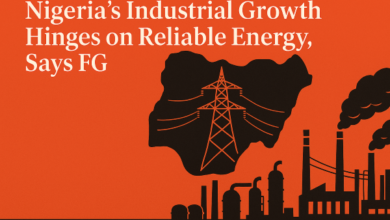NEWS
AFDB official attributes Nigeria’s stunted growth to bad governance, insecurity

Prof. Banji Oyelaran-Oyeyinka, Senior Special Adviser on Industrialisation to the President of the African Development Bank, has blamed high level corruption and insecurity for Nigeria’s current stunted economic growth .
Oyelaran-Oyeyinka said this in his lecture at the 8th edition of the Nigerian Society of Engineers Annual Distinguished Lecture series in Abuja.
The paper presented and entitled “Nigeria’s Development Reversal: Halting Descent Into Industrial Backwardness”, was made available to the News Agency of Nigeria (NAN) on Thursday in Benin.
Oyelaran-Oyeyinka, a professorial Fellow, United Nations University, and also a Fellow, Nigeria Society of Engineers, said because of the identified factors, Nigeria, once feared as giant of Africa, had become a shadow of itself.
According to him, protracted bad governance, high level corruption, coupled with the unabated insecurity across the states of the nation, have crippled Nigeria’s growth.
He stated that “Nigeria’s reversal of fortune manifests in several dimensions, namely: economic, social, technology and industrial conditions”.
” Ngeria regressed because of its industrial reversal as it has suffered massive reversal in industrial capacity: the ability to produce, process, and add value compared to its comparators.
“Nigeria ranks 99th on UNIDO’s Competitive Industrial Performance (CIP) index, while South Africa ranked 52nd in 2020.
” The CIP measures industrial capacity with the nation’s capacity to produce and export manufactured goods, deepening and upgrading its technological base, and its impact on global economy.
“Nigeria’s industry contribution to GDP is $650, while Manufacturing contribution is a mere 14.1 per cent, or $ 326, saying that by all indications, global statistics were not favourable for the growth of Nigeria.
“Nigeria is poor because the country has experienced, not only weak industrial growth, but also industrialisation.
Nigeria’s descent into into the ranks of poor nations resulted from the nexus of technological backwardness and resource dependence.
“The gap in knowledge, especially scientific and technological knowledge has terrifyingly widened the inability of nations like Nigeria to convert their natural resources to high value goods as well as master nature for growth.”
He lamented that “Nigeria has practically destroyed all the institutions necessary for this nation to acquire scientific and technological knowledge over the last 50 to 60 years”.
He said that primary, secondary schools, Universities Research and Development institutes (RDIs) were all in decay.
According to him, “due to a weak industrial base, Nigeria’s oil and gas make only small contribution to GDP, in spite of generating the bulk of earnings, being a highly technological and capital intensive industry that employs few people.
“We do not produce the materials and equipment used in the exploration and production donestically.
” There is minimal domestic manufacturing input in the oil sector, especially in the oil product refining.
” For Nigeria to get it right in its quest for consistent national growth, it has to embrace proactive and sensible political leadership as well as transformational leadership which has been globally acknowledged as a determinant for continued progress of nations”.
(NAN)










